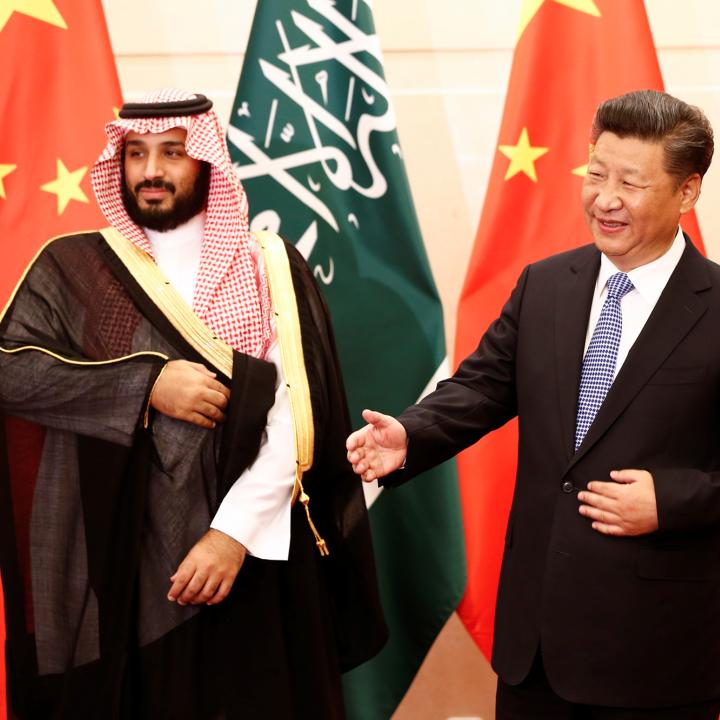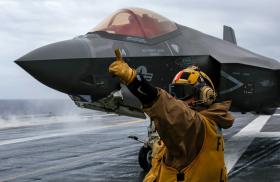
- Policy Analysis
- PolicyWatch 4140
Unpacking the China File in U.S.-Saudi Relations

As the Saudi crown prince visits Washington, the United States should use the occasion—as well as American leverage—to roll back China’s influence in the country.
Of the many topics on the agenda when Saudi Crown Prince Muhammad bin Salman visits Washington this week, few loom larger than U.S.-China competition. Overhanging the litany of issues both sides want to cover—a possible defense pact, a host of arms sales, and a potential future Abraham Accords deal with Israel—is a U.S. desire to ensure that closer Saudi ties with Washington simultaneously weaken Riyadh’s connection to Beijing. In today’s era of great power competition, even seemingly innocuous areas of cooperation with China can preclude cooperation with the United States. And many of the countries testing those limits are in the Middle East.
The Trump administration has a unique opportunity not only to reshape its relationship with Saudi Arabia, but to exemplify a sophisticated bilateral relationship in the current era. The administration has already taken an assertive approach to competition with China globally, seeking not only to contain Beijing’s influence, but in select cases to roll it back. It should use the visit by the crown prince, known as MbS, to likewise pursue such a course with Saudi Arabia in several areas, most notably technology and defense.
Technology
At the core of Vision 2030—MbS’s grand plan to revolutionize the Saudi state—is a desire to turn the country into a technological powerhouse. The kingdom has committed billions of dollars to artificial intelligence and other sophisticated technologies. Saudi officials see the country’s wealth and abundant energy resources as a key source of leverage in the AI race and have: channeled resources into building domestic data centers to process large swaths of information; created the flagship Humain entity with the aspiration to handle 6 percent of global AI traffic; partnered with technology giants like Google; and courted multiple American technological firms to the kingdom.
Yet Riyadh has also deepened its technological ties with China. Saudi Aramco—the world’s largest oil company—uses the Chinese AI platform DeepSeek at its data centers. Much of Saudi Arabia’s telecommunications network relies on Chinese firms such as Huawei. The Chinese e-commerce titan Alibaba has built cloud computing data centers as well as a training academy in the kingdom. Chinese companies Shanghai Lummington and China Mobile International have begun construction of massive data centers in Riyadh and Jeddah. And a 2024 New York Times exclusive found dozens of Chinese students from military-linked universities in attendance at the King Abdullah University of Science and Technology (KAUST), the epicenter of the kingdom’s efforts to make advances in AI and quantum computing.
Saudi Arabia’s technological ties to China have raised concerns in both the Biden and Trump administrations. Though Trump approved Saudi Arabia’s access to advanced Nvidia chips during his trip to the kingdom in May, Washington has yet to give final approval for their export. The concern is twofold: access and influence. Simply put, without strict safeguards, providing advanced U.S. technologies to countries with ties to China could give Beijing access to sensitive proprietary technologies and information.
Such access could, in turn, erode the U.S. competitive edge in these technologies. There is also a broader worry that countries relying on China for sensitive technologies will begin to replicate some of the ways Beijing uses AI and advanced technologies at home, most notably in governance. For these reasons, U.S. officials on both sides of the aisle have consistently expressed concerns about would-be recipients of advanced American technologies.
Defense
The United States remains Saudi Arabia’s primary security partner and the source of the vast majority of its military equipment. Yet as MbS has sought to modernize the Saudi state, he has looked to create a degree of independence in the country’s defense sector. This has meant an overarching focus on establishing a defense-industrial base that can design, build, and maintain indigenous military equipment. One of Vision 2030’s aims is to have 50 percent of Saudi military equipment manufactured domestically by 2050. To achieve this goal, the kingdom has increasingly pushed international firms to partner with Saudi firms and sought inclusion in R&D initiatives with other countries, most notably the nascent sixth-generation fighter project involving the United Kingdom, Japan, and Italy.
Saudi Arabia has also deepened its defense ties with China, reportedly purchasing armed drones, ballistic missiles, and air defense systems from Beijing. In 2022, Riyadh signed roughly $4 billion in new arms deals with Chinese firms, including an agreement to jointly design and manufacture drones. In 2024, China sent more than thirty defense firms under the “China Defense” banner to the Saudi World Defense Show. China also displayed the J-10 fighter jet’s Bayi aerobatic team, the first overseas exhibition for the group, and refueled the J-10s with the Y-20 tanker, its first public overseas refueling operation. Since 2019, Saudi military forces have engaged in maritime drills with their Chinese counterparts, and the Chinese naval escort task force has conducted evacuation operations and port calls in Saudi Arabia.
The kingdom’s ties with China have caused turbulence with the United States in the past. In 2023, an agreement between RTX (formerly Raytheon) and a Saudi defense firm to jointly produce radar and air defense systems fell apart over the Saudi company’s ties to Chinese as well as Russian defense companies. The collapse reportedly had trickle-down effects for other Western companies, which also backed away from the Saudi firm. The concern for America here is likewise protecting proprietary information. There is scant chance China will supplant the United States as the kingdom’s primary security partner, but Beijing has smartly identified niche markets where the United States has not sold in the past, namely armed drones and point-based air defenses. Given Beijing’s recent history of suspicious activity around U.S. bases, the possibility that Chinese weaponry will be used in countries that both host U.S. forces and purchase from China will continue to worry Washington policymakers.
Recommendations
The United States has historic levels of leverage in the Middle East for many reasons. President Trump has negotiated a ceasefire in Gaza, marshaled dozens of international leaders to support it, and is personally invested in its success. Washington is orchestrating a slow but steady embrace of the new Syrian government. Its military remains the only external force both willing and able to conduct operations in the region. And the United States has the most sophisticated computing chips on the market, the crown jewel for every Gulf AI aspirant, including Saudi Arabia. The Trump administration should use this unique position to not only contain China’s influence in the kingdom but to actively roll it back. Doing so could take several forms, including:
- Removing Chinese personnel and assets from joint U.S.-Saudi technological endeavors. This would include efforts like the KAUST technological hub, as well as data centers that receive U.S. chips and components. One of Saudi Arabia’s leading AI/semiconductor officials said in 2024 that the kingdom would divest from China if the United States asked. Washington should call his bluff.
- Limiting Saudi purchases of advanced Chinese weaponry. American officials can likely live with Saudi purchases of less sophisticated Chinese equipment, but the Trump administration should secure firm commitments that such purchases will not involve more advanced equipment. Further, the Trump administration should insist that Chinese weaponry not be placed on Saudi bases with U.S. forces present, and that Chinese technicians not gain access to those bases.
- Reducing Saudi Arabia’s reliance on Chinese telecommunications infrastructure. Under U.S. pressure in the first Trump administration, countries like the United Kingdom and Japan removed Huawei from their 5G telecommunications networks. Part of the concern was that Huawei’s presence in these networks could jeopardize advanced defense and security cooperation between those countries and the United States. As part of any potential defense pact, the United States should seek the same result in Saudi Arabia.
Grant Rumley is the Meisel-Goldberger Senior Fellow at The Washington Institute and director of its Glazer Foundation Program on Great Power Competition and the Middle East.



